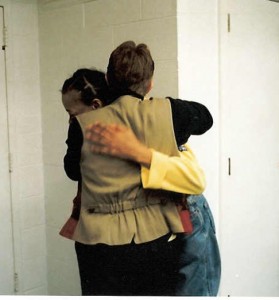Make your holiday gift today!
December 2010
They come in, our beloved ladies, in worn jeans and faded sweatshirts, in long skirts and scarves that they would wear in their native countries, in tattered blazers that they were lucky to pluck from the pile of second-hand clothes. They sit in the rocking chair knitting. They sip their coffee and do crossword puzzles. They chat with others. They bicker about the other women. One woman arrives after her radiation treatments for breast cancer. Her cheeks are gray. She is depleted, but she put her lipstick on in defiance. Another collapses in the chair beside me to tell me about her husband, the same story I have heard twenty times. She misses him. They were together for 52 years.
The Kenyan grandmother is making scarves; a jumble of yarn peeks out from her cloth bag. Her face bears the map of African wisdom and patience. She calls me “my daughter”. The woman with AIDS asks me to listen to her cough. It began over the summer and isn’t responding to antibiotics. Lines crease her forehead while I put my stethoscope on her chest. I help her make an appointment at the hospital for a chest X-ray. A younger woman shares with me that when “the deaf lady” died, she stayed with her at the hospital and held her hand until the end, and the spiritual connection that was forged by those shared moments inspired the younger woman to go to nursing school to become a hospice nurse.
My heart both lifts and breaks when I see one tiny woman: I know she has liver cancer and that it is only a matter of time before it will claim her, so her arrival fills me with joy. She carries herself with grace and more energy than is possible to imagine under the circumstances. She is cachetic, a wisp hidden under a hat to hide her nearly bald head. She comes to pick up the cans of liquid protein drink that we buy for her.
So many women, so many stories.
Each one gets a hug and a kiss from us. We love them. They could be our mothers, our grandmothers. They should be sitting in their living rooms, talking about their day with their families, reading notes from their grandchildren, taking cookies out of the oven, decorating the front door for the holidays.
But these women are homeless and poor. They sleep outside or in crowded shelters. They have to ask for everything, eat what is being served, walk the streets to pass the time until the doors open in the evening for a bed for the night, wear someone else’s old clothes. They are alone. Sometimes they pull out old wrinkled photographs from happier times, younger days, pictures of relatives that used to care about them but who aren’t around anymore.
Nearly 8% of the women we care for in the shelters are over 70 years old. These are the least, the lost and the last.
Please help us continue to give them the medical care, the supplies, but mostly the love that is missing from their lives.
Sincerely,
Roseanna H. Means, MD
Founder and President


